Planning a Comfortable Trip to Budapest for Seniors
Budapest is a fantastic city for older travelers. The "Pearl of the Danube" has tons of history, amazing buildings, and relaxing thermal baths you can enjoy without rushing around. The city has really worked hard on making things more accessible, with modern trams that are easy to get on, metro stations with elevators, and attractions that work well for people who want to take their time exploring.

Why Older Travelers Love Budapest
Budapest has this perfect mix of culture and comfort that's hard to find in other European capitals. You get incredible landmarks like Buda Castle and the Parliament Building, plus those famous thermal baths where you can just relax and soak. We love that the city doesn't feel rushed like Paris or London. You can take Danube river cruises, walk through quiet neighborhoods, and the public transport is getting better every year.
What really makes Budapest special is how many low-key activities there are. Thermal baths, boat rides, and strolls through historic areas aren't going to wear you out like hiking or intense walking tours. You get both the cultural experience and plenty of chances to rest, which is perfect when you're planning to stay for several days.
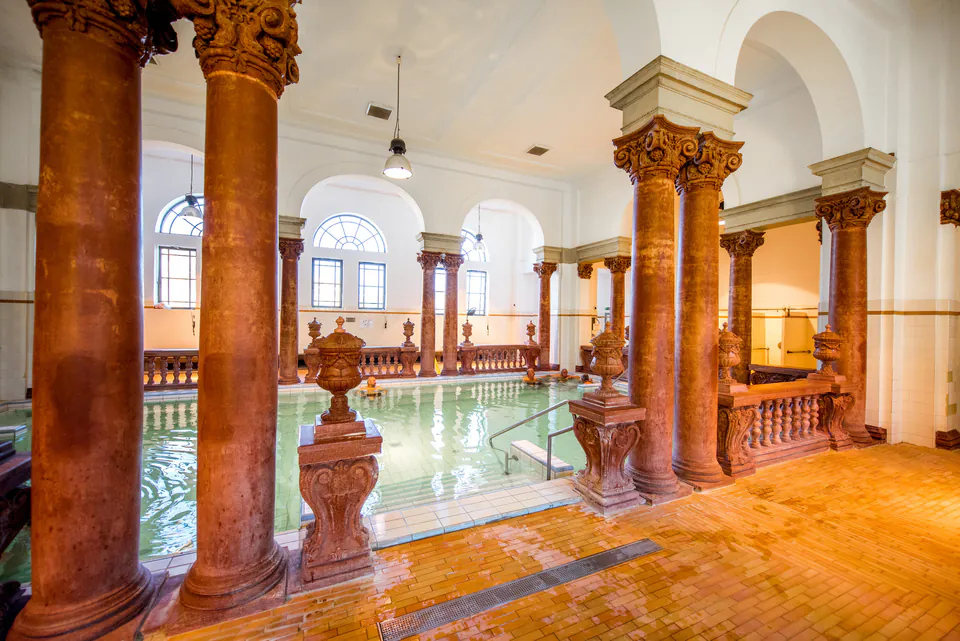
Getting Your Trip Ready
When to Go
We always tell people to visit in May-June or September-October. The weather is really nice and there aren't crazy crowds everywhere. Summer gets hot (around 86°F) and packed with tourists, while winter is cold and sometimes icy. Not fun when you're trying to enjoy yourself.
One thing we learned the hard way is that September can get busy with business conferences. Hotels fill up and prices jump even though there aren't as many tourists around. Book your hotel early no matter when you go, and be ready for some price surprises during conference season.
Getting Your Documents Ready
What You Need Make sure your passport is good for at least six months after you come home, or three months after you leave Europe. Most people (including Americans) don't need visas for trips under 90 days. You have to carry ID in Hungary, so keep your passport with you.
Travel Insurance is Really Important This is huge for older travelers because your regular health insurance probably won't cover you abroad. You need emergency medical coverage, dental care, medical evacuation (this can cost a fortune), trip cancellation protection, and lost baggage coverage. For Europe, you need at least €30,000 in medical coverage.
Essential Travel Insurance Coverage for Seniors
| Coverage Type | Why Critical for Seniors | Recommended Level |
|---|---|---|
| Emergency Medical | Higher likelihood of needing medical care | Comprehensive coverage, minimum €30,000 for Schengen |
| Medical Evacuation | Extremely high costs for transport to adequate care | Strongly recommended, should cover full costs |
| Trip Cancellation | Protects travel investment from unforeseen events | Cover prepaid, non-refundable costs |
| Pre-existing Conditions | Important for many seniors | Look for 'acute onset' or 'unexpected recurrence' coverage |
Health Stuff Talk to your doctor before you go and make sure your medications are legal in Hungary. Keep medicines in their original bottles with doctor's notes, and bring extra supplies plus backups. Know the generic names of your drugs and pack extra hearing aid batteries and spare glasses.
What to Pack
Good walking shoes are absolutely essential. Budapest has tons of cobblestone streets that can be tough on your feet. Pack light layers because the weather changes, a warm sweater for evenings, and something waterproof. Churches require covered shoulders.
We recommend a money belt or cross-body bag to avoid pickpockets in crowded areas. A small backpack that clips to your suitcase is handy, plus a reusable shopping bag. If you need mobility aids, book rentals ahead of time.
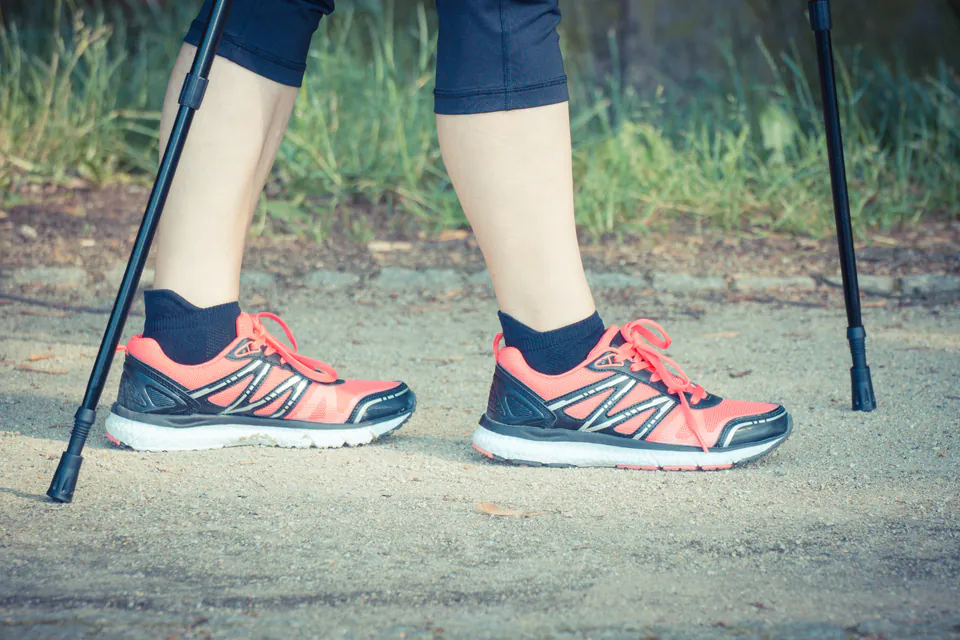
Getting Around Budapest
Airport and Train Help
Budapest Airport The airport has lots of help available including meet and greet, wheelchair assistance, baggage help, fast security lines, and lounge access. Companies like JODOGO and SkyVIP do this stuff, and airlines like Wizz Air can help if you call them 48 hours ahead. You can book online or call your airline directly.
To get to the city, Bus 100E goes straight to Deák Ferenc tér. EU people over 65 ride free, but the Budapest Card doesn't work on this bus. Bus 200E connects to Metro line M3 with regular ticket rules.
Train Stations MÁV-START helps people with mobility issues at the three main stations. Call +36 (80) 630 053 or email megrendeles@mav-start.hu at least 36 hours ahead. They have special train cars and wheelchair spaces with free wheelchair transport.
EU seniors 65+ travel free in second class on Hungarian trains but need to get free tickets and pay extra for express trains. First class costs the difference.
Public Transport for Seniors
Senior Benefits EU/EEA people over 65 generally ride free on Budapest's metro, tram, bus, and trolleybus, plus national trains. You need to show valid ID proving your age and nationality if inspectors ask.
For non-EU people over 65, it's confusing. Official BKK policy says non-EU people don't get senior discounts no matter how old they are. But some recent travelers say they rode free anyway. Non-EU seniors should check with BKK customer service when they arrive instead of assuming they get free rides.
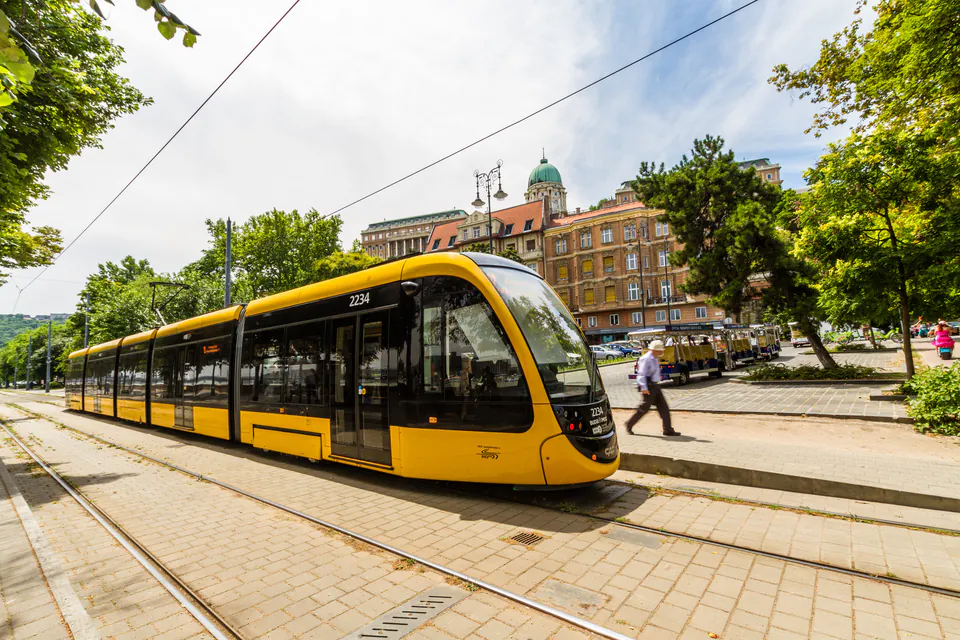
How Accessible Things Are Budapest's transport accessibility is all over the place. Metro line M4 is fully accessible with elevators everywhere. M3 line is getting better as they renovate stations, while M2 only has accessibility at a few stops. About 40% of trams are low-floor, with lines 4 and 6 having accessible trams all day.
Most buses are low-floor and accessible, and over 90% of trolleybuses have low floors. The BKK FUTÁR app helps you find accessible and low-floor options when planning routes.
Other Ways to Get Around
Accessible Taxis Some companies have wheelchair-accessible cars with ramps or lifts, but you usually need to book ahead. Good companies include Főtaxi, Citytaxi, and Bolt. Always make sure the meter is running and watch out for drivers who say their card machines are broken.
Mobility Aid Rentals Motion4rent has manual and electric wheelchairs, rollators, and mobility scooters that they'll deliver to your hotel. Staff can show you how to use everything at their shop. But reviews say some parts of the city are still hard to navigate with wheelchairs or scooters because of steps and uneven sidewalks.
Where to Stay
Best Areas for Quiet Stays
Hegyvidék (District XII) This quiet, green area has great public transport to the center but gives you peaceful surroundings perfect for nature walks in the Buda Hills. The Novotel Budapest City is a good option here.
Újlipótváros (District XIII) A calm neighborhood near the Danube and Margaret Island with authentic local feel, cafés, and restaurants away from tourist crowds. The Four Points by Sheraton Budapest Danube is a quality choice in this area.
Castle District (District I) Historic and pretty, but it can get crowded and expensive, with challenging cobblestone streets. But if you want to be close to major attractions, it's convenient.
Budapest Districts Comparison for Senior Travelers
| District | Senior Advantages | Considerations | Atmosphere |
|---|---|---|---|
| Hegyvidék (XII) | Quiet, green, nature walks, good transport | Further from main attractions | Peaceful residential |
| Újlipótváros (XIII) | Quiet, near Danube/Margaret Island, authentic | Fewer attractions within walking distance | Charming residential |
| Castle District (I) | Historic, scenic, many sights nearby | Crowded, expensive, cobblestones | Tourist-focused historic |
| Belváros-Lipótváros (V) | Very central, near many attractions | Can be crowded, expensive, noisy | Lively commercial center |
What to Look for in Hotels
Look for places with elevators, especially if you're staying on upper floors, and accessible bathrooms with walk-in showers if possible. Quiet rooms on side streets or in calmer areas help you sleep better. Having a restaurant in the hotel or breakfast service is convenient, and air conditioning is crucial in summer.
Good Hotel Options Central Hotel 21 is on a quiet side street but still central. The Radisson Collection Basilica has walk-in showers and accessibility features. For apartments, make sure there's elevator access and check reviews for noise levels. Places like "Quiet very central & stylish apt" on Madách Imre tér give you space and kitchen facilities with proper accessibility.
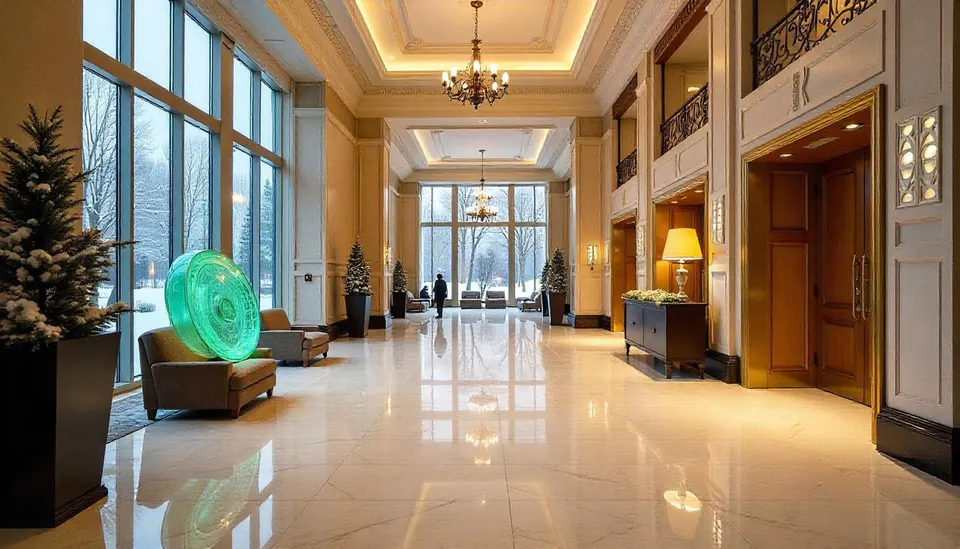
Seeing Budapest's Main Attractions
Famous Places Made Easier to Visit
Buda Castle and Castle District This UNESCO site has the Hungarian National Gallery, Budapest History Museum, and Széchényi National Library. Get up the hill using the funicular railway (Budavári Sikló), accessible buses (16, 16A, 116), or taxi. The historic area has cobblestone streets, but newer sections have smoother walkways.
Several elevators and ramps help you get around, including at School Street and Castle Bazaar. Major attractions like the National Gallery and History Museum are wheelchair accessible. The lower terraces of Fisherman's Bastion work for wheelchairs, but upper levels have limited access. Matthias Church has barrier-free entrance.
Hungarian Parliament Building This beautiful neo-Gothic building along the Danube is accessible for people with disabilities. Wheelchair users should email tourist.office@parlament.hu ahead of time. You can get there easily via tram 2, bus, or metro. Guided tours are available, and you should book tickets online at www.jegymester.hu/parlament.

St. Stephen's Basilica One of Hungary's most important churches, where they keep St. Stephen's right hand. You can reach the dome via 364 steps or elevator, though the elevator line can be really long. General accessibility includes elevators, wide doors, and accessible restrooms. Disabled visitors plus one companion get free entry, but you need to cover your shoulders.
Relaxing at Budapest's Famous Thermal Baths
Gellért Thermal Bath Right in the center and connected to Hotel Gellért, this bath has accessible sections including women's thermal pools, sauna, swimming pool, and small jacuzzi. Elevators go to the swimming pool, but you can't access outdoor areas. Pool lifts work in the women's 38°C pool and main jacuzzi. They do medical treatments and have equipment for wheelchair users to access the main indoor pool.
Accessible Bath Options Paskal Thermal Bath and Pesterzsébeti Thermal Bath are set up for wheelchairs with accessible entrances, pathways, and pool lifts, but they're further from the city center. Széchenyi Thermal Bath is really popular and located in City Park, but apparently it's not fully accessible for wheelchair users.
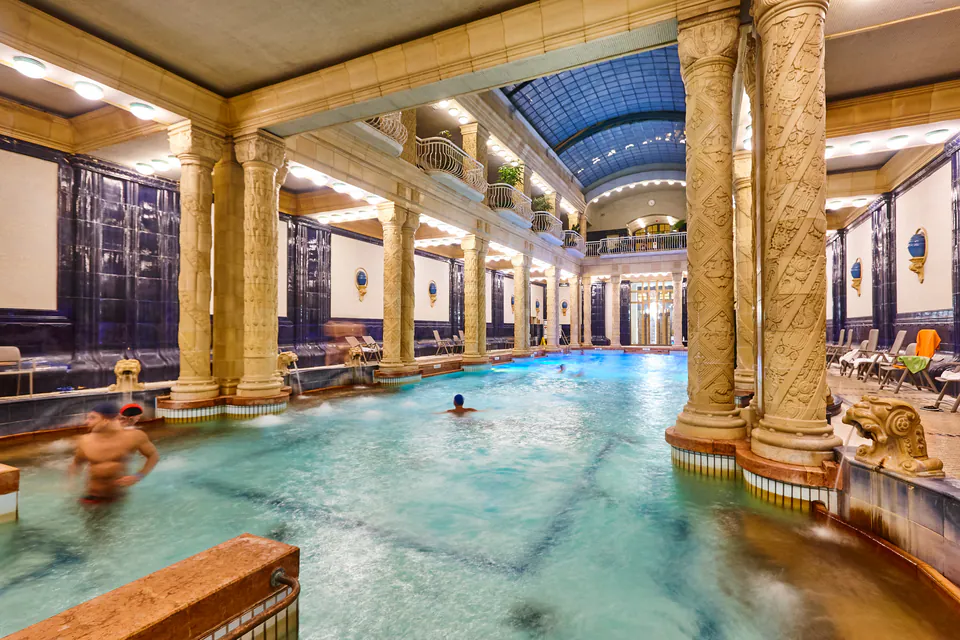
Easy Danube River Cruises
River cruises give you amazing city views, especially at night. You can choose from basic sightseeing tours (1-2 hours) to dinner and music cruises. Many cruise companies work with senior needs and have things like onboard elevators (like MS Beethoven). Longer river cruises might have cabins with accessible bathrooms and walk-in showers.
Some companies have quieter "Leisure" or "Classic" shore trips with rest breaks and bus options for city tours. Ships might have walking sticks or wheelchairs available. For short visits, local tours of 1-3 hours make the most sense, though accessibility details for shorter boats aren't as clear.
Senior Discounts and Benefits
EU vs Non-EU Discount Rules
The general rule is that senior discounts exist but are often just for EU/EEA people, especially free admission over 70 or big 50% reductions. Non-EU seniors should expect to pay full adult prices or smaller "senior discounts" if they're offered to everyone.
Major Attractions Discount Guide EU/EEA people over 70 typically get free entry to state museums, with 50% discounts for ages 62-70. Non-EU seniors usually pay full price, with Matthias Church being an exception offering 30% discounts for all visitors over 60. The Budapest Card might offer senior discounts on the card purchase itself.
Senior Discount Overview for Major Attractions
| Attraction | EU/EEA Senior Discount | Non-EU Senior Discount | Budapest Card Benefit |
|---|---|---|---|
| Parliament Building | EEA adult: full price | No specific senior discount mentioned | Possible partner discount |
| Hungarian National Gallery | EEA 70+: Free, 62-70: 50% off | Likely full price | Free entry to permanent exhibitions |
| Matthias Church | EEA 70+: Free, 62-70: 50% off | 60+ all visitors: 30% discount | Free entry |
| Museum of Fine Arts | EU/EEA 70+: Free, 62-70: 50% off | Full price confirmed | 10% discount |
For public transport, EU/EEA people over 65 travel free on BKK lines and national trains/buses. For non-EU people over 65, the free travel policy is unclear and should be checked locally when you arrive.
Daily Tips for Getting Around
Managing Your Energy and Finding Places to Rest
Plan a relaxed schedule and don't try to do too much. Mix activities with rest periods. The Pest side is mostly flat and easy to walk, while the Buda side, especially Castle Hill, is hilly. Use transport like the funicular or bus 16 to get to higher areas.
You can rest on benches in lots of parks and squares, including City Park, Margaret Island, Károlyi Garden, and Erzsébet Square. Cafés are everywhere, so you can always stop for a break. Use public transport for longer distances and consider Hop-On Hop-Off buses for overviews without much walking.
Staying Safe and Avoiding Scams
Budapest is generally safe with low violent crime, but watch out for pickpockets and petty theft, especially in crowded areas, on public transport, and at tourist sites. Common tourist scams include restaurant overcharging (always check menus before ordering), taxi fraud (use good companies and make sure the meter is on), public transport fines (make sure you validate tickets properly), and currency exchange issues (count zeros carefully with Hungarian forints).

Healthcare and Communication
English-speaking medical care is available through places like FirstMed Budapest, with English-speaking staff 24/7 near Széll Kálmán Square. Doctorsa gives online consultations with English-speaking doctors starting from €20. Pharmacies (marked with green crosses) are easy to find and sell both prescription and over-the-counter medications.
Most restaurants in tourist areas have English menu translations, though quality varies. Many staff speak basic English, especially in tourist places. Free Wi-Fi is widely available in hotels, cafés, restaurants, and public areas through the "FREE_NET" network in parks and public buildings.
Eating Comfortably
Many restaurants include a service charge (10-12.5%) on bills, so you don't need to tip extra. Without service charges, 10-15% tips are good for decent service. Hungarian portions can be huge, and some restaurants offer half-portions at about 60% of full price. Look for "Napi Menu" (daily lunch menu) on chalkboards for discounted two-course meals, which is great for seniors who want lighter meals or want to save money.

Sample Itineraries for Older Travelers
Relaxed 3-Day Trip
Day 1: Pest's Grand Buildings and Danube Views Morning visit to the Hungarian Parliament (book the accessible guided tour ahead of time) then rest at nearby Kossuth Square. Afternoon trip to St. Stephen's Basilica using the elevator to get dome views. Evening gentle sightseeing cruise on the Danube for 1-1.5 hours.
Day 2: Buda's Castle Hill and Royal History Morning trip up to Castle Hill via accessible bus 16/16A/116 or funicular. Check out Matthias Church and the lower accessible terraces of Fisherman's Bastion. Optional afternoon visit to Hungarian National Gallery or Budapest History Museum in Buda Castle.
Day 3: Market Life, Relaxation, and Culture Morning visit to Great Market Hall using elevators between floors. Afternoon choice between thermal bath visit (Gellért for central location or Paskal/Pesterzsébeti for better accessibility) or Museum of Fine Arts visit at Heroes' Square with accessible City Park walk.
Extended 5-Day Experience
This longer trip builds on the 3-day plan but with much more relaxed pacing, doing only one major thing per day. Extra days include Margaret Island exploration with its accessible paths and benches, a dedicated thermal bath or museum day, and flexible final day for revisiting favorite spots or exploring quiet neighborhoods.
We really like the 5-day plan because it's super relaxed, perfect for seniors. You can have "rest days" for just enjoying the atmosphere, reading in parks, or taking long lunches. Organized package tours also work for people who want structured experiences with guaranteed accessible accommodations and transport.